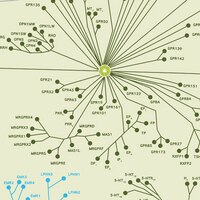Salt-sensitive hypertension and reduced fertility in mice lacking the prostaglandin EP2 receptor.
Kennedy, C R, et al.
Nat. Med., 5: 217-20 (1999)
1999
Show Abstract
Prostaglandins (PGs) are ubiquitous lipid mediators derived from cyclooxygenase metabolism of arachidonic acid that exert a broad range of physiologic activities, including modulation of inflammation, ovulation and arterial blood pressure. PGE2, a chief cyclooxygenase product, modulates blood pressure and fertility, although the specific G protein-coupled receptors mediating these effects remain poorly defined. To evaluate the physiologic role of the PGE2 EP2 receptor subtype, we created mice with targeted disruption of this gene (EP2-/-). EP2-/- mice develop normally but produce small litters and have slightly elevated baseline systolic blood pressure. In EP2-/- mice, the characteristic hypotensive effect of intravenous PGE2 infusion was absent; PGE2 infusion instead produced hypertension. When fed a diet high in salt, the EP2-/- mice developed profound systolic hypertension, whereas wild-type mice showed no change in systolic blood pressure. Analysis of wild-type and EP2-/- mice on day 5 of pregnancy indicated that the reduced litter size of EP2-/- mice is due to a pre-implantation defect. This reduction of implanted embryos could be accounted for by impaired ovulation and dramatic reductions in fertilization observed on day 2 of pregnancy. These data demonstrate that the EP2 receptor mediates arterial dilatation, salt-sensitive hypertension, and also plays an essential part in female fertility. | 9930871
 |











